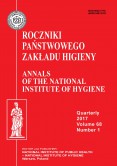Rocz Panstw Zakl Hig 2014, 65(2): 119-126
The use of vitamin supplements among adults in Warsaw: is there any nutritional benefit?
[The use of vitamin supplements among adults in Warsaw: is there any nutritional benefit?]
ABSTRACT
Background. The use of dietary supplements is widespread and can contribute substantially to total nutrient intake. However, it also generates some potential risks in the case of unreasonable and excessive use of such products.
Objective. To estimate the prevalence of supplementation and the vitamin supplement contribution to total intake among Warsaw population aged 20-74 years.
Material and methods. Nutrient intake and supplement use were studied in a representative sample of Warsaw population in years 2011/12 (486 men and 421 women) and in 2001 (658 and 671 respectively). The vitamin levels were analyzed in reference to the Recommended Dietary Allowance (RDA) and the tolerable upper intake level (UL).
Results. In the years 2011/12 the use of dietary supplements (vitamins and minerals) was reported by 31% men and 40% women. Vitamin intake from food showed the deficiency of vitamins D, B1 and folates and adequate intake of vitamins A, C, E, B2, B6, B12. Supplementing with vitamins D and B1 as well as folic acid contributed to better RDA fulfillment. Supplementing with vitamins A, C, E, B2, B6 and B12 was not justified because these vitamins were taken in sufficient amounts with food. In 1.3%-14.9% supplement users, the total intake of vitamins A, C, E and B6 exceeded the UL. The prevalence of supplementation of vitamins A, C and E did not change between 2001 and 2011/12, but the total intake of vitamin A in both sexes and vitamins C, E in women was significantly higher in 2001.
Conclusions. The use of dietary supplements in Warsaw population was widespread and in case of some vitamins- unreasonable.
STRESZCZENIE
Wprowadzenie. Przyjmowanie suplementów diety jest popularne i może stanowić istotne źródło witamin i składników mineralnych. Jednocześnie niekontrolowane ich pobranie może stwarzać niebezpieczeństwo nadmiernego spożycia.
Cel badań. Ustalenie rozpowszechnienia i zasadności stosowania suplementacji wśród mieszkańców Warszawy w wieku 20-74 lat.
Materiał i metody. Sposób żywienia oraz przyjmowanie suplementów oceniono w reprezentatywnej próbie populacji Warszawy w roku 2011/12 (u 486 mężczyzn i 421 kobiet) oraz w roku 2001 (u odpowiednio 658 i 671 osób). Pobranie witamin analizowano w odniesieniu do zalecanego dziennego spożycia (RDA) oraz górnych bezpiecznych poziomów spożycia (UL).
Wyniki. W latach 2011/2012 suplementy witaminowo-mineralne przyjmowało 31% mężczyzn i 40% kobiet. Spożycie witamin z żywnością było niedoborowe w przypadku witamin D, B1 i folianów oraz zgodne z zaleceniami dla witamin A, C, E, B2, B6, B12. Suplementacja witaminami D i B1 oraz kwasem foliowym przyczyniła się do lepszej realizacji RDA. Natomiast uzupełnianie diety witaminami A, C, E, B2, B6 oraz B12 nie miało uzasadnienia, ze względu na wystarczające ich spożycie z żywnością. W przypadku 1,3%-14,9% osób stosujących suplementy witamin A, C, E, i B6 notowano przekroczenie poziomów UL. Częstość przyjmowania suplementów witamin A, C i E była podobna w latach 2001 i 2011/12, ale sumaryczne pobranie witaminy A u obu płci oraz C, E u kobiet było istotnie wyższe w roku 2001.
Wnioski. Wzbogacanie diety suplementami przez mieszkańców Warszawy było szeroko rozpowszechnione, a w przypadku niektórych witamin nieuzasadnione.
Downloads: 2993


